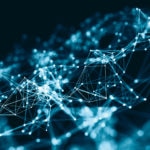The information era: 5 keys to its future
The study "The Information Generation: Transforming the Future, Today" (commissioned by EMC2) reviews 5 keys aspects for the future development of data processing, privacy, digital transformation and the omnichannel approach.

The future is already here — it's just not very evenly distributed”
This quote by the science fiction author William Gibson introduces the study's perspective about the future of the "information generation". Where will the current trends lead us to? According to the study The Information Generation: Transforming the Future, Today (commissioned by EMC) the answers are already out there.
1. Information economy
It is very likely that the information market will be regularized. Selling, donating and exchanging useful and standardized information in open markets will soon become a reality.
This view of the future is strengthened by the example of Datacoup. This startup is developing a platform for average users to be able to play a role in the data markets, by monetizing their demographics and interests.
2. Connected ecosystems
Aware, connected and responsive areas. The Internet of Things promises to be another source of democracy.
A clear example is the ad hoc network developed by Cohda Wireless: drivers in a traffic jam can share information that is useful for their security ( such as the direction and location of vehicles), while they receive information from sensors positioned across the road. There are limitless connection possibilities, and they all move us closer to driverless cars.
3. Increased decision-making
The help and importance of artificial intelligence in decision-making processes will reach unimaginable levels.
Nowadays, when there is need for maintenance or repair tasks in the Hong Kong subway, an artificial intelligence program recommends the time and resources to carry out the work. Using an algorithm that groups human engineering and maintenance knowledge together, the Hong Kong subway saves up to $800,000.
4. Multi-sensorial communication
Information is no longer distributed through traditional channels. Human beings will not be left out and will end up absorbing information through their senses.
This is already happening. With Apple Watch, notifications are received by "tapping" the wrist so that users can interact and call each other's attention. It is also possible to send a message with your heart rate for another Apple Watch user to feel it on their skin.
5. Technology that protects your privacy
According to the study, justice in terms of privacy will be achieved by maximizing the wave of user-oriented tools created for this purpose. The problem exists and most users can feel it.
EMC's 2014 Privacy Index shows how almost 60% of the world's population say they have less privacy than the year before. Also, 74% believe that it will be even more difficult to protect their privacy in digital environments over the next five years.
In the USA, the EPIC.org foundation has already warned about the unjust and inappropriate practices derived from studying and analyzing data. This type of defense of consumers' privacy, which is already shaping government policies and giving rise to debates and discussions, represents the final step in the business world's move toward consumer benefits.
Read the full study here.